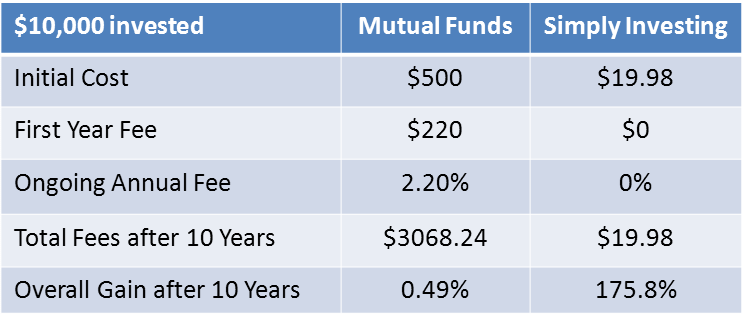Blog
Top 5 Reasons Why People Buy Index Funds
Ever since the whole idea of “Efficient Market Theory” came into vogue on the investing scene academics and several “experts” have been touting the advantage of index investing. For those of you that aren’t sure of exactly what index investing entails, it is basically a very low-maintenance strategy to guarantee your investments will return the exact average of the overall market.
An index of a specific market (you can buy them for just the USA stock market, the Canadian stock market, or the …
Why I Started Investing On My Own
I didn’t used to invest on my own. For years I left my hard-earned money to the “professionals” to invest on my behalf. For years I bought mutual funds thinking that was the only way to invest and that’s what I was supposed to do.
Here’s my story on how I went from being dependant on others to being independent, from losing money to making money. I bought my first term deposit (GIC, Guaranteed Investment Certificate) in 1988. Interest rates went higher after that so I could have made more money…
Do You Have The Top 3 Qualities of a Successful Investor?
Do you have what it takes to be a successful investor?
Here are the three must have attributes of a successful investor, patience, optimism, and education. Without these three attributes you are doomed to failure.
1. Patience
In the short-term stock prices go up and down. In the long-term stocks prices rise and dividends increase. Recessions come and go, nothing lasts forever. We may have a small down turn in the economy that last a few months to a recession that could last a year or two.
As …
Do Mutual Fund Salespeople Favour Commissions Over the Best Interest of Their Clients?
“The [sales] commissions encourage sales people to favour one product over another based on how much they will get paid, rather than what is in the best interests of the consumer”, says FAIR (The Canadian Foundation for the Advancement of Investor Rights).
FAIR recently issued an open letter to the Canadian Finance Minister to tackle high mutual fund fees which it says are harming Canadians’ ability to save for retirement. “The high cost of owning mutual funds impacts the ability of Canadians t…
Stock Markets Are Down. Should You Buy, Sell, or Panic?
Recently the stock market has been on a roller coaster ride, the markets go down, up and then down again. Should you buy/sell your investments (stocks, mutual funds, ETFs, bonds) or panic? Don’t panic! In the short-term markets fluctuate, this is normal.
Here what you should do…. Don’t panic, it’s not the end of the world, though the news media may want you to think otherwise. Remember bad news sells more papers, and increases TV news ratings. The news media lives off of advertising (radio, tv,…
Watch Out! A High Payout Ratio Could Get You in Trouble
Smart investors always check the payout ratio, it only takes 5 seconds and it could save you lots of money in the long run. The Payout Ratio is the ratio of money a company gives out to shareholders compared to how much money the company keeps for itself. This ratio is very important because it can be a good indicator of how much you as an investor can expect to receive in the future.
As a shareholder you are part owner of the company. As the owner you are entitled to share in the company’s pro…
3 Steps to Determine When You Can Stop Working
Most people believe that they have to work till they’re 65 years old. Some people believe that they will have no choice but to work for the rest of their lives. Then there is a minority of people who love their jobs so much they never want to quit, which is fine.
But what everyone wants is freedom, the freedom to work/travel/play when and where they want, when they want. How do you achieve freedom sooner than later? Well, the exercise is quite simple and only requires 3 steps.
Click here to re…
Can You Invest on Your Own?
Yes you can invest on your own and be very successful at it. You don’t need to rely on financial planners, mutual fund sales people, or investment advisors.
Investing isn’t rocket science and you certainly don’t need a degree in finance or economics. My approach to investing is simple, buy stocks in quality companies when they are undervalued. By quality I mean companies that:
- Are financially healthy
- Have low debt
- Have very little competitors
- Are virtual monopolies in their field
- Are co…
Mutual Funds vs Simply Investing

In this example let’s take a look at $10,000 invested in mutual funds and $10,000 invested on your own, what I like to call the Simply Investing way.
Both methods are simple, in option #1 you simply handover $10,000 to your mutual fund advisor. In option #2 you simply deposit $10,000 into your trading account and purchase quality stocks when they are undervalued.
After 10 years which investment will be better? Take a look at the table above, and you can clearly see that the Simply Investing …
490,409% Return? Who is this man?
Which American corporation has had an overall gain of 490,409% from 1964 to 2010 and who is this man in the picture? The company is Berkshire Hathaway and it is owned by the man shown in the picture, Warren Buffett. In 2011 Warren Buffett was ranked the third wealthiest person in the world.
Buffett was born in Omaha, Nebraska in 1930. Born to middle class parents, Buffett never inherited large sums of money or won the lottery. While studying for his business degree at the University of Nebraska…

